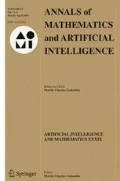Abstract
In this paper, we propose a new nonmonotonic logic called general default logic. On the one hand, it generalizes Reiter’s default logic by adding to it rule-like operators used in logic programming. On the other hand, it extends logic programming by allowing arbitrary propositional formulas. We show that with this new logic, one can formalize naturally rule constraints, generalized closed world assumptions, and conditional defaults. We show that under a notion of strong equivalence, sentences of this new logic can be converted to a normal form. We also investigate the computational complexity of various reasoning tasks in the logic, and relate it to some other nonmonotonic formalisms such as Lin and Shoham’s logic of GK and Moore’s autoepistemic logic.
Similar content being viewed by others
References
Antoniou, G., van Harmelen, F.: A Semantic Web Primer. MIT, Cambridge (2004)
Bidoit, N., Froidevaux, C.: Negation by default and unstratifiable logic programs. Theor. Comput. Sci. 78(1), 86–112 (1991)
Borgida, A., Brachman, R.J., McGuinness, D.L., Resnick, L.A.: CLASSIC: a structural data model for objects. In: Proceedings of the 1989 ACM SIGMOD International Conference on Management of Data, pp. 58–67 (1989)
Clark, K.L.: Negation as failure. In: Gallaire, H., Minker, J. (eds.) Logics and Databases, pp. 293–322. Plenum, New York (1978)
Delgrande, J., Schaub, T.: Compiling reasoning with and about preferences into default logic. In: Proceedings of IJCAI’97, pp. 168–174 (1997)
Donini, F.M., Lenzerini, M., Nardi, D., Schaerf, A.: AL-log: integrating datalog and description logics. J. Intell. Inf. Syst. 10(3), 227–252 (1998)
Eiter, T., Gottlob, G.: Complexity results for disjunctive logic programming and application to nonmonotonic logics. In: International Logic Programming Symposium, pp. 266–278 (1993)
Eiter, T., Gottlob, G.: The complexity class \(\Theta^2_p\): recent results and applications in AI and modal logic. In: FCT ’97: Proceedings of the 11th International Symposium on Fundamentals of Computation Theory, pp. 1–18 (1997)
Eiter, T., Fink, M., Tompits, H., Woltran, S.: Simplifying logic programs under uniform and strong equivalence. In: Proceedings of LPNMR’04, pp. 87–99 (2004)
Ferraris, P.: Answer sets for propositional theories. In: Proceedings of LPNMR’05, pp. 119–131 (2005)
Gelfond, M., Lifschitz, V.: The stable model semantics for logic programming. In: Proceedings of ICLP’88, pp. 1070–1080 (1988)
Gelfond, M., Lifschitz, V.: Classical negation in logic programs and disjunctive databases. New Gener. Comput. 9, 365–385 (1991)
Gelfond, M., Lifschitz, V., Przymusinska, H., Truszczynski, M.: Disjunctive defaults. In: Proceedings of KR’91, pp. 230–237 (1991)
Gelfond, M.: Logic programming and reasoning with incomplete information. Ann. Math. Artif. Intell. 12(1–2), 89–116 (1994)
Gottlob, G.: Complexity results for nonmonotonic logics. J. Log. Comput. 2(3), 397–425 (1992)
Gottlob, G.: NP trees and Carnap’s modal logic. J. ACM 42(2), 421–457 (1995)
Grosof, B., Horrocks, I., Volz, R., Decker, S.: Description logic programs: combining logic programs with description logic (2003)
Halpern, J.Y., Moses, Y.: A guide to completeness and complexity for modal logics of knowledge and belief. Artif. Intell. 54(3), 319–379 (1992)
Horrocks, I., Patel-Schneider, P.F.: A proposal for an owl rules language. In: Proceedings of WWW’04, pp. 723–731 (2004)
Janhunen, T.: On the intertranslatability of autoepistemic, default and priority logics, and parallel circumscription. In: Proceedings of JELIA’98. LNCS, vol. 1489, pp. 216–232 (1998)
Konolige, K.: On the relation between default and autoepistemic logic. Artif. Intell. 35(3), 343–382 (1988)
Ladner, R.E.: The computational complexity of provability in systems of modal propositional logic. SIAM J. Comput. 6(3), 467–480 (1977)
Liberatore, P., Schaerf, M.: The complexity of model checking for propositional default logics. Data Knowl. Eng. 55(2), 189–202 (2005)
Lifschitz, V.: Nonmonotonic databases and epistemic queries. In: IJCAI’91, pp. 381–386 (1991)
Lifschitz, V., Tang, L.R., Turner, H.: Nested expressions in logic programs. Ann. Math. Artif. Intell. 25(3–4), 369–389 (1999)
Lifschitz, V., Pearce, D., Valverde, A.: Strongly equivalent logic programs. ACM Trans. Comput. Log. 2(4), 526–541 (2001)
Lin, F., Chen, Y.: Discovering classes of strongly equivalent logic programs. In: Proceedings of IJCAI’05, pp. 516–521 (2005)
Lin, F., Shoham, Y.: A logic of knowledge and justified assumptions. Artif. Intell. 57, 271–289 (1992)
Lin, F., Zhou, Y.: From answer set logic programming to circumscription via logic of GK. In: Proceedings of the IJCAI’07, 441–446 (2007)
Marek, V., Truszczynski, M.: Autoepistemic logic. J. ACM 38(3), 588–619 (1991)
Moore, R.: Possible-world semantics for autoepistemic logic. In: Readings in Nonmonotonic Reasoning, pp. 137–142 (1987)
Motik, B., Rosati, R.: A faithful integration of description logics with logic programming. In: Proceedings of IJCAI’07, pp. 477–482 (2007)
Niemelä, I.: Towards automatic autoepistemic reasoning. In: Proceedings of JELIA ’90, pp. 428–443 (1991)
Papadimitriou, C.H.: Computational Complexity. Addison-Wesley, Reading (1994)
Pearce, D., Tompits, H., Woltran, S.: Encodings for equilibrium logic and logic programs with nested expressions. In: Proceedings of EPIA ’01, pp. 306–320 (2001)
Pearce, D.: A new logical characterisation of stable models and answer sets. In: Proccedings of NMELP’96. LNCS, vol. 1216, pp. 57–70 (1997)
Reiter, R.: A logic for default reasoning. Artif. Intell. 13, 81–132 (1980)
Rosati, R.: Model checking for nonmonotonic logics: algorithms and complexity. In: Proceedings of IJCAI’99, pp. 76–83 (1999)
Stillman, J.: The complexity of propositional default logics. In: Proceedings of AAAI’92, pp. 794–799 (1992)
Truszczynski, M.: Strong and uniform equivalence of nonmonotonic theories—an algebraic approach. In: Proceedings of KR’06, pp. 389–399 (2006)
Truszczynski, M.: The modal logic S4F, the default logic, and the logic here-and-there. In: Proceedings of AAAI’07, pp. 508–513 (2007)
Turner, H.: Strong equivalence for logic programs and default theories (made easy). In: Proceedings of LPNMR’01, pp. 81–92 (2001)
Zhou, Y., Lin, F., Zhang, Y.: General default logic. In: Proceedings of LPNMR’07, pp. 241–253 (2007)
Zhou, Y., Lin, F., Zhang, Y.: Embedding general default logic into the logic of GK. In: Proceedings of NMR’08, pp. 76–83 (2008)
Author information
Authors and Affiliations
Corresponding author
Rights and permissions
About this article
Cite this article
Zhou, Y., Lin, F. & Zhang, Y. General default logic. Ann Math Artif Intell 57, 125–160 (2009). https://doi.org/10.1007/s10472-009-9161-6
Published:
Issue Date:
DOI: https://doi.org/10.1007/s10472-009-9161-6




